Washington: The denuclearisation of the Korean Peninsula would remain a US policy objective should Vice President Kamala Harris win the White House race in November, said a former Pentagon official, dispelling concerns about the exclusion of the goal in the Democratic Party’s new policy platform.
Colin Kahl, former undersecretary of defence for policy, made the remarks, saying that people appear to be “overreading” the platform.
Kahl is known to have participated in a process to write the platform, expected to help set the tone for Harris’ policy stances, Yonhap news agency reported.
During the Democratic National Convention in Chicago on Monday, party delegates officially adopted the platform that did not mention the goal in contrast with the 2020 document that stated a pledge to advance the “longer-term goal of denuclearisation.”
“Denuclearisation of the Korean Peninsula remains an objective of this (Biden) administration and, I would have to imagine, a Harris-Walz administration,” Kahl told a press briefing.
Noting the reality of a challenging and time-consuming process to reach that objective, he highlighted a “near-term” priority to beef up deterrence against North Korean threats.
“I think realistically, in the near term, I don’t think that experts who look at the Korean Peninsula see an imminent prospect of denuclearisation,” he said.
“So the near-term priority has to be to make sure that we’re defending our alliance commitments as it relates to South Korea, but also to close allies like Japan … but also strengthening our deterrent.”
The omission of the denuclearisation language in the 2024 platform raised questions over whether it signals any potential policy focus shift or reflects North Korea’s unwillingness to talk or other hurdles toward that goal.
Some observers said that the exclusion might reflect Washington’s emphasis on doubling down on deterrence to counter North Korean threats following Pyongyang’s rejections of talks over a denuclearisation deal.
The omission also caused concerns that Pyongyang could misconstrue it as an opening to seek the US’ acknowledgement of the North as a de facto nuclear power and negotiations on arms control rather than on denuclearisation — an anathema to Seoul.
(IANS)
















